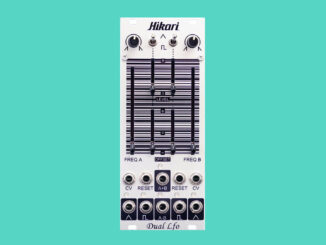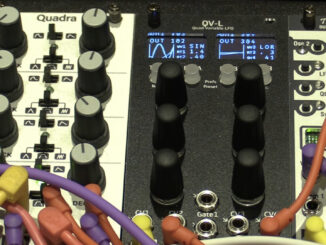Xaoc Devices strikes back with Batumi II, a new, improved, and enhanced version 2 of its popular LFO with more original features.
One of the most popular LFO modules is the Batumi from the Polish company Xaoc Devices. It has an original design that packs a lot of functionality in a compact module: quad LFO generation, four operation modes, assignable waves, and more.
A company from the Far East was so impressed by the originality and success that they quickly recreated it for a fraction of the price. Shit happens though Xaoc, and they wasted no time in tears and started developing the successor. Please welcome the Batumi II, aka “Originality strikes back”.
Xaoc Devices Batumi II
From the front panel (10HP), the new Batumi looks like the original, internally, however, the module has been completely renewed.
According to Xaoc Devices, they remade the hardware and software from scratch with a more powerful CPU, better converters, anti-aliased waves, and more.
The starting point remains the same: four wide-range LFOs with individual outputs for sine, assign, and rectangle waves. Ready for audio rate modulations.
Like in version 1, the channel can operate independently, and you can link, phase shift, and divide them. New in Batumi II is a frequency multiplication mode, opening new possibilities.
Then, Xaoc Devices has added multiple improvements, including a neat addition related to syncing. When synced to an external clock source, each channel’s frequency slider (A-D) selects a clock division for that channel’s outputs.
Another big news is that the Batumi II now hosts all the original POTI expander module features. This includes switching sync modes and selecting the assign waveform.
Plus, you can benefit from a new random waveform in the assignable section. I like the waveform flips with the thick switches on my Batumi v1 expander, but this way, Xaoc Devices can pack more features into a new one.
Also neat is that the LFOs now track 1V/oct. This means you can turn them into 4 VCOs.
New Poti II Expander
An important partner of the original Batumi was its Poti expander. This is also the case again in Batumi II but also in a completely revised form.
First, the new POTI II (4HP) gives you per-channel frequency input attenuation and sine & assign output attenuation. You can do it individually per channel or simultaneously.
Further, it unlocks per-channel shape modulation for the LFOs with switchable destinations. You can either use wave folding, set it to assign output waveform selection, or apply PWM. And all this again per channel. This makes Batumi II a significantly more powerful and multi-timbered quad LFO.
Also neat is that it now stores settings during a power cycle. So, the parameters are retained the next time you switch your system on.
Plus, there is an LED indication that gives you an overview of the store setting and the current pot position.
First Impression
I’m pleased that Xaoc Devices has taken advantage of this and developed a new Batumi II quad LFO. The new features match the module perfectly and make it even more comprehensive. Above all, the new Poti II Expander takes the Batumi into new areas.
Xaoc Devices Batumi II and Poti II will be available in December 2023 for 329€ and 89€, respectively.
More information here: Xaoc Devices
Available at my partners






so, here’s a vendor who gets it: someone copies your device? improve it! standing still never got anyone home. on time. innovation at work; we got a cheap version of a good thing, and a better version of the old stand by.
btw, your captcha mech is total bullshit. it times out constantly.
I will forward it to my ad provider.
I completely agree with your assessment of “B” knockoff as unoriginal and ethically dubious, but I don’t think referring to them as a “company from the Far East” does much for the strength of your argument. A review that wants to stand up for the underdog undermines itself by incorporating the shades of xenophobia. Maybe you didn’t intend it that way, but there’s a long history of this. Before “made in Japan” was a mark of quality, it was a dog-whistle (one that a certain ex-president is still strangely blowing), same with made in Korea. Calling out a neoliberal system in which companies manufacture wherever labor is cheapest and pay little regard to intellectual property is laudable, but be careful how you go about it.
I mean with “company from the far east” that Behringer is a company from Manila (the Philippines). Not more not less instead of always giving the name Behringer a spot in an article. Plus, i’m from a german-speaking country in Europe where far east is “Fernost” and is nothing harmful. Just a name to say that it comes from Asia which is locaded in the far east of the world if you stay in Europe.
Right, as I said, you might not have intended it that way. But it’s good to be aware that there are people who would absolutely read it with negative connotations and to ask yourself if you would want to be inadvertently condoning their point of view. I definitely agree with the substance of your article, by the way. And I don’t mean to come across as the political correctness police, it’s just that my family is from this part of the world and there is a definitely a personal sting felt when people use phrases like “cheap knockoffs from the Far East”. Not trying to cast doubt on your intention in writing the article, which I support for sure, but I did want to point out this reality.